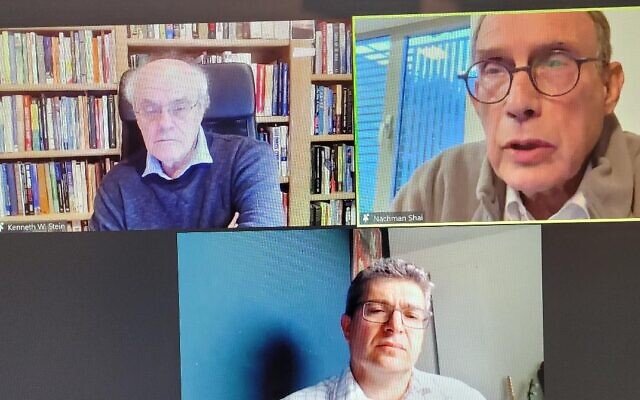CIE Hosts Webinar on Israel’s Civil Society
Panelists laud the “miracle” of Israel but worry about its future.

As part of its year-long focus on Israel for its 75th birthday, the Center for Israel Education held an hour live webinar, May 7, to discuss not only the country’s unlikely birth and survival, but also its current viability.
Former Israeli Diaspora Minister Nachman Shai stated it simply: “Israel is a miracle. The very fact it survived so many years, it’s a miracle.” Fellow panelist, Bar Ilan University professor Jonathan Rynhold, similarly proclaimed, “Israel’s achievements are off the charts.”
Shai, born in Jerusalem, and Rynhold, an immigrant from the U.K., both noted the accomplishments of the country in response to a question from moderator Ken Stein, founder of the Center for Israel Education, who focused the seminar on Israel’s civil society which has sparked weekly protests in several cities.
Stein suggested three possible factors behind the current unrest among Israel’s population: the country’s prime minister, Benjamin Netanyahu, his government’s proposed overhaul of the judicial system, and the civil society’s speculation about other legislation the current coalition might propose. “What has caused these four months of very high volume of Israel engagement against the coalition?” he asked.
Both panelists had the same answer. “Netanyahu is trying to save himself,” said Shai, noting that the prime minister “might end up in jail” if he is convicted of the several charges of corruption that he is on trial for. Shai suggested that Netanyahu’s ongoing trial “takes a lot of his time and attention” which is not healthy for the country’s security.
Rynhold stated that “without the Netanyahu court case, none of this could be happening. He has a large amount of personal responsibility for this mess.”
However, both panelists saw the positive side of the protests that have brought hundreds of thousands of Israelis into the streets weekly since January. Netanyahu “never expected this reaction,” which Shai called a rebirth of Israel and rebirth of Zionism. “People realize they can’t take [it] for granted. Now the dream of many is to have a constitution. The protests are inspiring,” said Shai who noted that he has addressed the crowds of protesters weekly in various cities. “People are walking proudly with Israeli flags. Now, the flag is everyone’s. This is a source of pride and excitement.”
Rynhold admitted that when the protests began, he was “profoundly worried” how they would unfold. But he pointed to the “very positive energy” in the crowds that have included grandmothers and granddaughters. “These are the people who are protecting the borders and paying taxes.”
In addition to the legal precariousness of the prime minister, Rynhold said another underlying cause of the protests is the divide between the religious community and the secular Israelis, which he said has been growing for decades.
“In recent years, the image of the legal system somehow belonging to the left and seculars who sit in coffee houses in Tel Aviv,” and supposedly are trying to take the vote away from the right-wing is a “dangerous myth.”
But the different perspectives of the two sides have led to a vacuum of trust, he contended.
Stein noted that during the recent conferences of major American Jewish organizations that were held in Israel in honor of the country’s 75th birthday, Israeli protesters in some cases pleaded with the Diaspora Jews to help them defeat the judicial overhaul legislation. He asked his panelists for their view of the role of Diaspora Jews.
When Shai served as Diaspora Minister under the previous government, he tried to promote more conversation between the two largest Jewish communities. “Israel is the state of the Jewish people,” he said, so “they should express their opinions.”
He noted that many participants attending the conferences did actively support and participate in the demonstrations.
Rynhold, however, suggested that while Diaspora Jews should be considered when Israel is figuring out its values as a Jewish state on issues such as who can pray at the Western Wall, but when it comes to politics or the question of peace with its neighbors, that should be left to the Israelis.
“There’s a difference between engagement and politics. Engagement is showing you care.”
Neither panelist chose to predict the outcome of the current conflict between Israelis. But Rynhold said that he is most troubled over what will happen in the next few months when the issue is settled.
“Both sides will blame the other when negotiations fail,” he said, adding that he believes the “damage won’t be easy to fix.”



comments